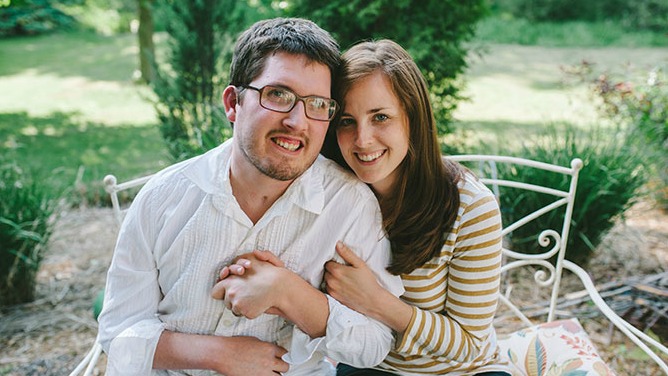A couple years ago, a video about Ian and Larissa Murphy’s marriage went viral. In some ways, they exhibit a conventional story of young love. They met in college and wanted to get married. But Ian suffered a traumatic brain injury after a car accident. Their plans were tenuous at best as Ian lay in a coma in a hospital bed.
The accident came 10 months into their relationship. For the next two years, Ian worked to regain his ability to talk, then the couple began talking about marriage. Two years after that, they married on Ian’s late father’s birthday, 8-28-2010—a date referenced in the title of their new book, Eight Twenty Eight. The number also refers to a favorite Bible passage, Romans 8:28: “And we know that for those who love God all things work together for good, for those who are called according to His purpose” (ESV).
Although both Ian and Larissa contributed to the book, most of the narrative takes place during the years of Ian’s coma and recovery. With graceful prose and fluid storytelling, Larissa explains the factors that led her to remain so intimately connected to Ian even though they were not yet engaged and his prognosis was grim.
At 29, Larissa still sounds at times like a young wife, learning to serve her husband and grow her faith as best she can. She is not a trained theologian, but she does not shy away from the theological questions posed by a traumatic brain injury. She writes honestly about the blessings they have experienced amidst, and even because of, the hardship of Ian’s long recovery and his different life with a disability.
Hers is a testimony to God’s faithfulness amidst woundedness, a testimony to the truth of Romans 8:28, even when all things do not yet look as though they have worked together for good.
After reading Eight Twenty Eight, I interviewed Larissa and Ian by email about God's miracles in their lives as well as the prayers that have gone unanswered. A version of their marriage video, updated earlier this year, appears at the end of the post.
What made you decide to write a book?
Larissa: I’ve always wanted to write a book. Ian’s dad and I tried to start a book a few times over the years, because he had the same desire. But we didn’t know the ending of Ian’s story yet. And not that we do now, but our marriage provided some closure on the chapter of our life that we wrote of in Eight Twenty Eight.
Ian: My wifey. She asked me, and I said yes. Because if my wifey wants to do it, it must be good.
How did the writing process work? You both contributed as authors, but the story is a first-person narrative from Larissa’s perspective. Ian, what was your role as an author?
Ian: I sat and listened and provided commentary and feedback.
Larissa: Ian is a much better writer than me, so I needed his brain to critique my words.
Two words that could be used to describe aspects of your story are “accident” and “miracle.” How do you understand God’s role in Ian’s car accident?
Ian: He’s sovereign. Say no more.
Larissa: Agreed with Ian. It’s so easy to get caught up on whether God causes suffering. Or if he simply allows it. I’ve decided that I’d rather rest in knowing that, as Ian said, no matter what we face, God is over all. “Before me, as behind, God is, and all is well.”
Do you think of Ian’s recovery as a miracle?
Ian: Heck yeah. I was gonna die but God saved me. That is the miracle.
In what ways has God healed both of you?
Ian: My body. And spiritually, I’m stronger. I now know that God is a big God, and I’m a little human.
Larissa: God has healed me in the sense that I long for him more than for this world, which is much different than (I felt) before September 30 (the day of Ian’s accident). That is healing to me.
What prayers have gone unanswered?
Larissa: Prayers for complete healing for Ian. Prayers that his dad would not have died from cancer. But yet, we’re ok. God has not left us.
Before Ian is able to communicate much as he recovers from a lengthy coma, you realize that he can read. What did this discovery do for you both? What are you each reading now?
Larissa: Realizing that he could read meant that his vocabulary was still intact—a huge miracle. We discovered he could read before he started talking, and the discovery gave us a ton of hope.
Ian still relies on someone to read to him, as his vision is fairly poor. It would take a giant typeface to work for him. I’m reading Les Miserables -so good!
One of my favorite parts of the book comes when Larissa asks Ian to show her “the old you.” Ian responds, “News flash…there’s only one Ian.” Larissa, do you still think of Ian in terms of old and new? Are you still longing for the old?
Larissa: I feel like I’m in love with two Ians. On one hand, the old Ian I miss a ton, because he had all of his abilities. But on the other, this Ian that I now know is so much happier, sweeter, and more grateful. At the core of his being, though, he’s the same. He’s just required to show it in different ways. I often wonder what “version” of Ian I’ll have in heaven. I like to think it will be a perfect combination of both.









